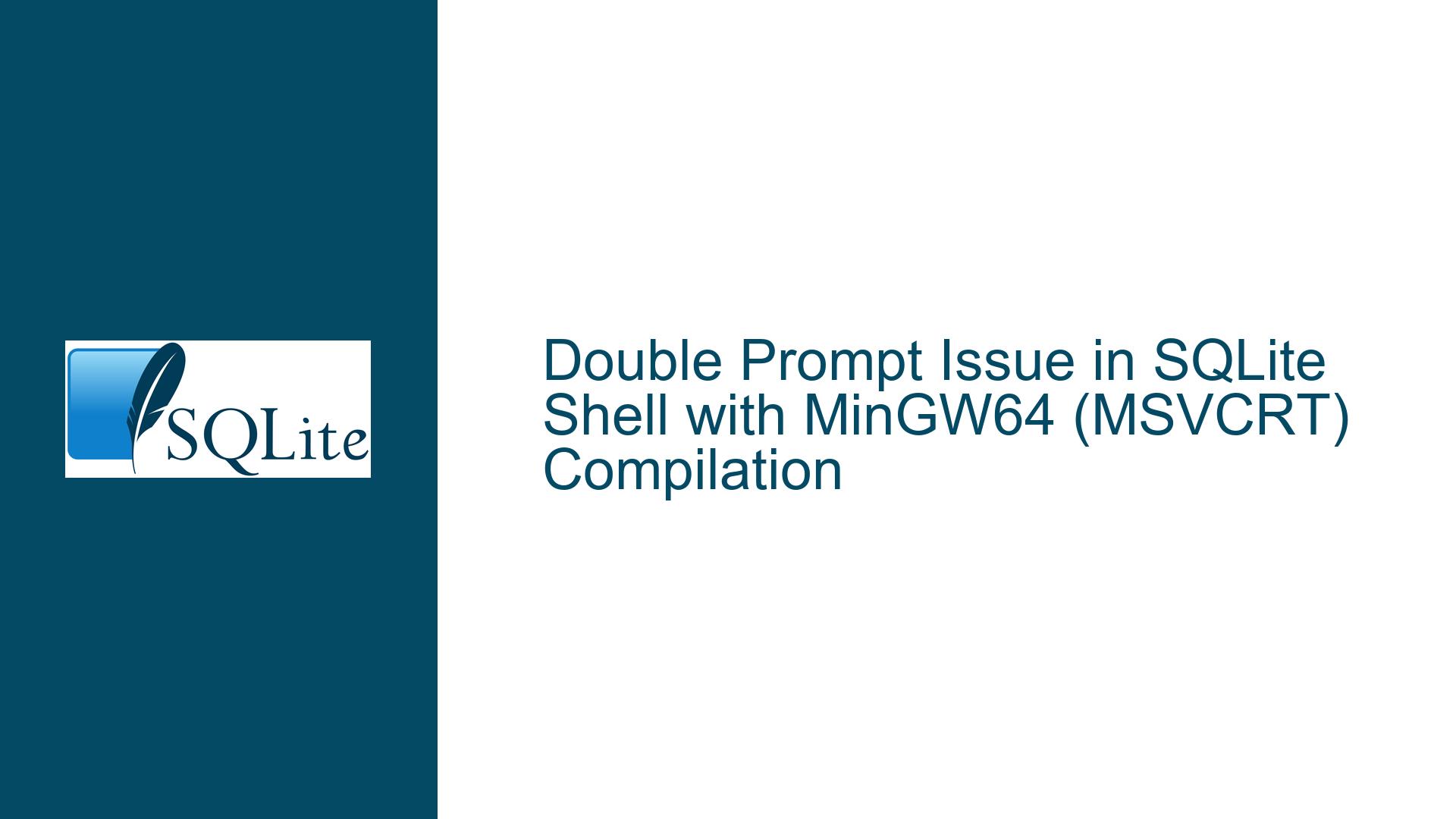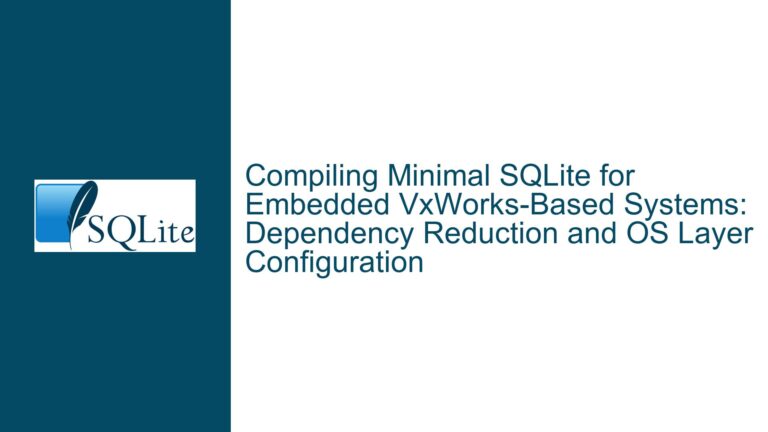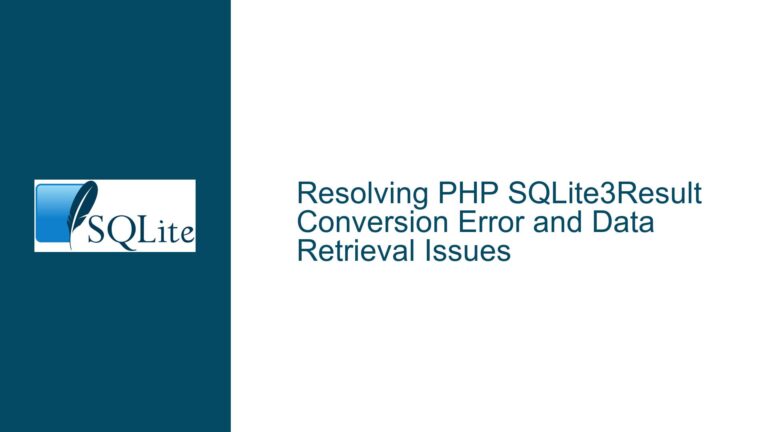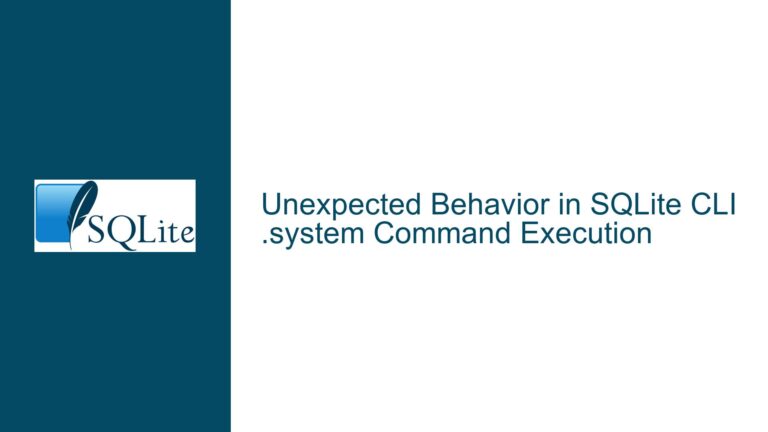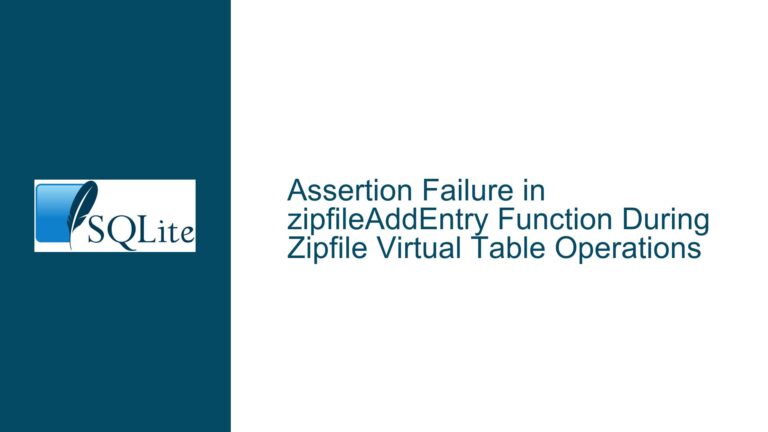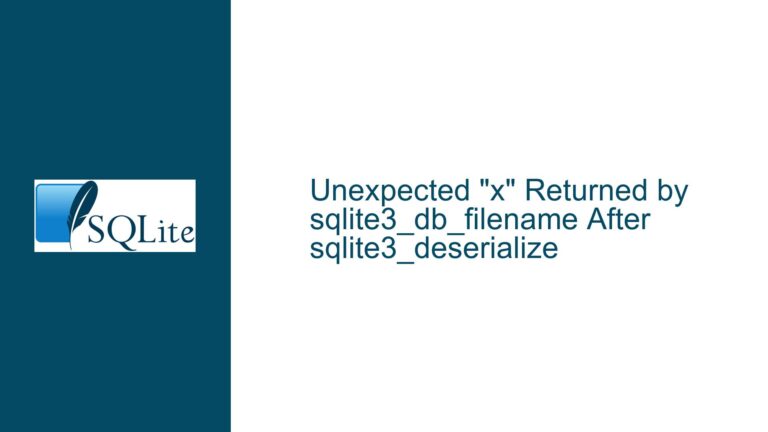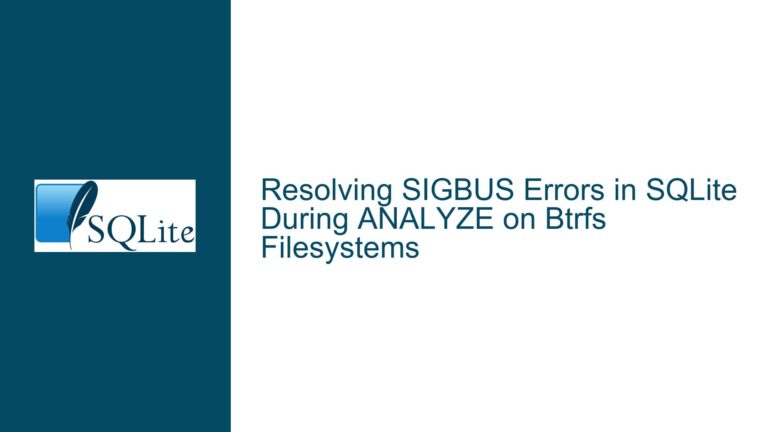Double Prompt Issue in SQLite Shell with MinGW64 (MSVCRT) Compilation
Issue Overview: Double Prompt in SQLite Shell with MinGW64 (MSVCRT)
The core issue revolves around a double prompt behavior observed in the SQLite shell when compiled using MinGW64 with the MSVCRT runtime library on Windows. Specifically, after pressing the Return key, the prompt text is printed twice, leading to an output like this:
sqlite> sqlite>
sqlite> sqlite>
This issue was introduced in SQLite’s branch-3.47 and is tied to a specific commit (f97f9944b8) from 2024-09-26. The problem manifests only when using the MSVCRT runtime library, while the newer UCRT runtime library does not exhibit this behavior. Additionally, the issue was also reported in cross-compiled builds using Cygwin and MSYS environments, though it was later resolved in the latest trunk check-ins.
The double prompt issue is not merely a cosmetic annoyance; it indicates a deeper underlying problem with how input is being handled, particularly with line endings and the interaction between the SQLite shell and the runtime library. The issue is significant because it affects the usability of the SQLite shell in environments where the MSVCRT runtime is still prevalent, such as older Windows systems or specific development setups.
Possible Causes: Line Ending Interpretation and Runtime Library Differences
The double prompt issue is likely caused by a combination of factors related to line ending interpretation and the runtime library used during compilation. Here’s a detailed breakdown of the potential causes:
Line Ending Interpretation:
- Windows traditionally uses
\r\n(carriage return followed by line feed) as its line ending sequence. However, Unix-based systems use\n(line feed) alone. The issue may arise from how the SQLite shell interprets these line endings when reading input from the console. - The commit
f97f9944b8introduced a change in how the SQLite shell reads input. Previously, the shell used a custom function (fGetsUtf8) that relied on the WIN32API callReadConsoleWto read data from stdin. This function was designed to handle Unicode input and likely processed line endings in a way that avoided the double prompt issue. - After the commit, the shell switched to using
sqlite3_fgets, which defers to eitherfgetwsorfgetsdepending on the platform. This change may have altered how line endings are processed, leading to the double prompt behavior when using the MSVCRT runtime.
- Windows traditionally uses
Runtime Library Differences:
- The MSVCRT (Microsoft Visual C Runtime) and UCRT (Universal C Runtime) libraries handle input/output operations differently. The MSVCRT is an older runtime library that has been largely superseded by the UCRT in modern Windows development.
- The double prompt issue only occurs with the MSVCRT runtime, suggesting that the way this library handles line endings or console input is incompatible with the new input handling mechanism introduced in SQLite.
- The UCRT, being a more modern and standardized runtime, likely processes line endings in a way that aligns with the expectations of the updated SQLite shell code, avoiding the double prompt issue.
Binary Mode File Handling:
- The
openChrSource()function in SQLite usesfopen(..., "rb")to open files in binary mode. This mode disables newline translation, meaning that line endings are read as-is without any conversion. - While this setting is appropriate for reading files, it may have unintended side effects when reading from the console, especially if the runtime library expects text mode handling of input. This could contribute to the double prompt issue when combined with the MSVCRT runtime.
- The
Cross-Compilation Environments:
- The issue was also observed in cross-compiled builds using Cygwin and MSYS, which emulate Unix-like environments on Windows. These environments may introduce additional layers of complexity in how input is handled, particularly with respect to line endings.
- The fact that the issue was resolved in later trunk check-ins suggests that changes were made to better handle these environments, but the root cause likely remains tied to line ending interpretation and runtime library behavior.
Troubleshooting Steps, Solutions & Fixes: Addressing the Double Prompt Issue
To resolve the double prompt issue, several approaches can be taken, ranging from code-level fixes to workarounds in the compilation process. Here’s a detailed guide to troubleshooting and fixing the problem:
Code-Level Fixes:
Revert to Previous Input Handling Mechanism:
One potential solution is to revert the changes introduced in commitf97f9944b8and restore the previous input handling mechanism that usedfGetsUtf8andReadConsoleW. This would ensure compatibility with the MSVCRT runtime and eliminate the double prompt issue.
However, this approach may not be ideal if the new input handling mechanism was introduced to address other issues or improve functionality.Modify
sqlite3_fgetsto Handle MSVCRT:
Another approach is to modify thesqlite3_fgetsfunction to explicitly handle the MSVCRT runtime. This could involve adding logic to detect the runtime library being used and adjusting the line ending processing accordingly.
For example, the function could be modified to strip extra carriage return characters when running under MSVCRT, ensuring that only a single prompt is displayed.Use Text Mode for Console Input:
TheopenChrSource()function could be modified to use text mode ("rt") instead of binary mode ("rb") when reading from the console. This would enable newline translation and potentially resolve the double prompt issue.
However, this change would need to be carefully tested to ensure it doesn’t introduce other issues, particularly when reading from files.
Compilation Workarounds:
Switch to UCRT Runtime:
As noted in the discussion, the double prompt issue does not occur when using the UCRT runtime. Therefore, one straightforward solution is to switch to a MinGW64 installation that uses UCRT instead of MSVCRT.
This can be achieved by downloading a MinGW64 distribution that includes UCRT, such as the one available from winlibs.com.Modify Compilation Flags:
Another workaround is to modify the compilation flags to ensure compatibility with the MSVCRT runtime. For example, adding the-D_WIN32_WINNT=0x0601flag during compilation may help align the behavior of the SQLite shell with the MSVCRT runtime.
Additionally, experimenting with other flags related to input/output handling, such as-D__USE_MINGW_ANSI_STDIO, may yield positive results.
Environment-Specific Fixes:
Update to Latest SQLite Trunk:
The discussion mentions that the double prompt issue was resolved in the latest trunk check-ins. Therefore, updating to the latest version of SQLite may automatically fix the problem.
This approach is particularly useful for users who are not tied to a specific version of SQLite and can afford to use the latest development code.Use Native Builds:
For users experiencing the issue in cross-compiled builds, switching to native builds may resolve the problem. Native builds are compiled directly on the target platform and are less likely to encounter issues related to line ending interpretation or runtime library differences.
Testing and Validation:
Verify Line Ending Handling:
To confirm that the issue is related to line ending interpretation, developers can add logging or debugging statements to the input handling code. This would allow them to inspect the raw input data and determine whether extra carriage return characters are being introduced.
For example, printing the ASCII values of each character in the input buffer can help identify discrepancies in line ending handling.Test with Different Runtimes:
Developers should test the SQLite shell with both MSVCRT and UCRT runtimes to verify the behavior. This would help confirm whether the issue is specific to MSVCRT and whether the proposed fixes are effective.
Additionally, testing in different environments (e.g., Cygwin, MSYS, native Windows) can provide further insights into the root cause of the issue.
Community and Documentation:
Report the Issue to SQLite Developers:
If the issue persists despite the above steps, it should be reported to the SQLite development team. Providing detailed information about the environment, compilation process, and observed behavior can help the developers identify and address the problem in future releases.
The SQLite forum and bug tracker are appropriate channels for such reports.Document the Workaround:
For users who cannot immediately switch to UCRT or update to the latest SQLite trunk, documenting the workaround (e.g., using a specific MinGW64 distribution or compilation flags) can help others facing the same issue.
This documentation can be shared on forums, blogs, or internal knowledge bases to ensure widespread awareness.
By following the above troubleshooting steps and solutions, developers can effectively address the double prompt issue in the SQLite shell when using MinGW64 with the MSVCRT runtime. The key is to understand the underlying causes, experiment with different approaches, and validate the results through rigorous testing.
